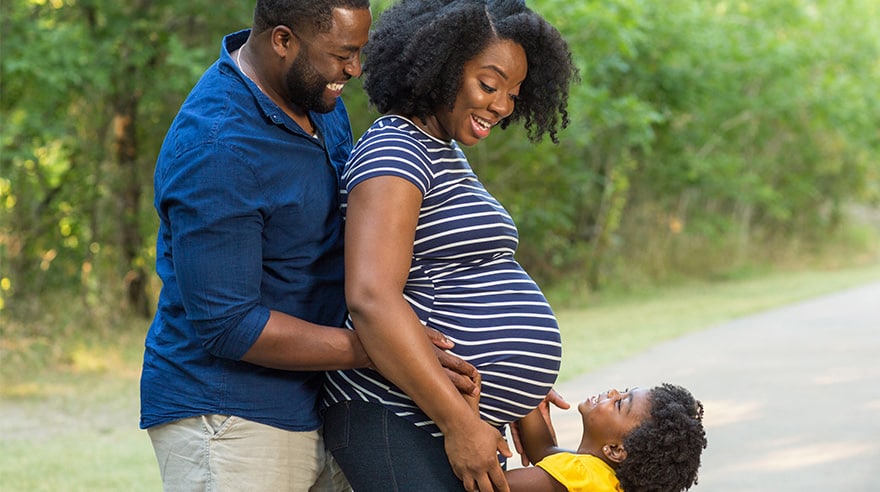

9 AM - 5 PM



Treating Breast Cancer during Pregnancy
If you are diagnosed with breast cancer while pregnant, your treatment options will be more complicated because you will want to get the best treatment for your cancer while also protecting the baby. The type and timing of treatment will need to be planned carefully and coordinated between your cancer care team and your obstetrician.
When treating a pregnant woman with breast cancer, the goal is the same as when treating a non-pregnant woman: to cure the cancer whenever possible, or to control it and keep it from spreading if it can’t be cured. But the extra concern of protecting a growing fetus may make treatment more complicated.
Is it safe to have breast cancer treatment during pregnancy?
If you are pregnant and have breast cancer, you might have hard choices to make, so get expert help and be sure you know all your options. Pregnant women can safely get treatment for breast cancer, although the types of treatment used and the timing of treatment might be affected by the pregnancy. If you are pregnant and have been diagnosed with breast cancer, your treatment recommendations will depend on:
It is generally safe to have surgery for breast cancer while you’re pregnant. Chemotherapy seems to be safe for the baby if given in the second or third trimester of pregnancy, but it isn’t safe in the first trimester. Other breast cancer treatments, such as hormone therapy, targeted therapy, and radiation therapy, are more likely to harm the baby and are not usually given during pregnancy.
Treatment choices can become complicated if there is a conflict between the best known treatment for the mother and the well-being of the baby. For example, if a woman is found to have breast cancer early in her pregnancy and needs chemotherapy right away, she may be advised to think about ending the pregnancy. need.
Some older studies found that ending a pregnancy in order to have cancer treatment didn’t improve a woman’s prognosis (outlook). Even though there were flaws in these studies, ending the pregnancy is no longer routinely recommended when breast cancer is found. Still, this option may be discussed when looking at all the treatment choices available, especially for metastatic (stage IV) or aggressive cancers that may need treatment right away.
Breast cancer surgery during pregnancy
Surgery to remove the cancer in the breast and nearby lymph nodes is a major part of treatment for any woman with early breast cancer, and generally is safe in pregnancy.
The type of surgery a woman might have depends on the extent of her cancer and when the cancer is diagnosed during the pregnancy.
Is anesthesia safe during pregnancy?
Surgery for breast cancer generally carries little risk to the baby. But there are certain times in pregnancy when anesthesia (the drugs used to make you sleep for surgery) may be risky for the baby.
Your surgeon and anesthesiologist, along with a high-risk obstetrician will need to work together to decide the best time during pregnancy to operate. If the surgery is done later in the pregnancy, your obstetrician may be there just in case there are any problems with the baby during surgery. Together, your doctors will decide which anesthesia drugs and techniques are the safest for both you and the baby.
Treatment after surgery
Depending on the cancer’s stage, you may need more treatment such as chemotherapy, radiation therapy, hormone therapy, and/or targeted therapy after surgery to help lower the risk of the cancer coming back. This is called adjuvant treatment. In some cases, this treatment can be put off until after delivery.
Chemotherapy
Chemotherapy (chemo) may be used after surgery (as adjuvant treatment) for some earlier stages of breast cancer. It also can be used by itself for more advanced cancers.
Chemo is not given during the first 3 months (first trimester) of pregnancy. Because a lot of the baby’s development occurs during this time, the safety of chemo hasn’t been studied in the first trimester. The risk of miscarriage (losing the baby) is also the greatest during this time.
For many years, it was thought that all chemo would harm an unborn baby no matter when it was given. But studies have shown that certain chemo drugs (such as doxorubicin, cyclophosphamide, fluorouracil, and the taxanes) used during the second and third trimesters (months 4 through 9 of pregnancy) don’t raise the risk of birth defects, stillbirths, or health problems shortly after birth, though they may increase the risk of early delivery. Researchers still don’t know if these children will have any long-term effects.
If you have early breast cancer and you need chemo after surgery (adjuvant chemo), it will usually be delayed until at least your second trimester. If you are already in the third trimester when the cancer is found, chemo may be delayed until after birth. The birth may be induced (brought on) a few weeks early in some women. These same treatment plans may also be used for women with more advanced cancer.
Chemo is generally not recommended after 35 weeks of pregnancy or within 3 weeks of delivery because it can lower the mother’s blood cell counts. This could cause bleeding and increase the chances of infection during birth. Holding off on chemo for the last few weeks before delivery allows the mother’s blood counts to return to normal before childbirth.
Treatments that typically are on hold until after delivery
Some treatments for breast cancer can harm the baby and are not safe during pregnancy. If these treatments are needed, they are usually scheduled after the baby is born.
Radiation therapy: Radiation therapy to the breast is often used after breast-conserving surgery (lumpectomy) to help reduce the risk of the cancer coming back. The high doses of radiation used for this can harm the baby any time during pregnancy. This may cause miscarriage, birth defects, slow fetal growth, or a higher risk of childhood cancer. Because of this, doctors don’t use radiation treatment during pregnancy.
For some women whose cancer is found later in the pregnancy, it may be possible to have a lumpectomy during pregnancy and then wait until after the baby is born to get radiation therapy. But this treatment approach has not been well-studied. Waiting too long to start radiation can increase the chance of the cancer coming back.
Hormone therapy: Hormone therapy is often used as treatment after surgery or as treatment for advanced breast cancer in women with hormone receptor-positive (estrogen or progesterone) breast cancer. Hormone therapy drugs used for breast cancer include tamoxifen, anastrozole, letrozole, and exemestane.
Hormone therapy should not be given during pregnancy because it can affect the baby. It should be delayed until after the woman has given birth.
Targeted therapy: Drugs that target HER2, such as trastuzumab (Herceptin), pertuzumab (Perjeta), ado-trastuzumab emtansine (Kadcyla) and lapatinib (Tykerb), are important in treating HER2-positive breast cancers. In women who aren’t pregnant, trastuzumab is used as a part of treatment after surgery, pertuzumab can be used with trastuzumab before surgery, and all of these drugs can be useful in treating advanced cancer. But based on studies of women who were treated during pregnancy, none of these drugs are considered safe for the baby if taken during pregnancy.
Everolimus (Afinitor) and palbociclib (Ibrance) are also targeted drugs that can be used with hormone therapy to treat advanced breast cancer. Again, these and other targeted drugs are thought to be unsafe to use during pregnancy.
Can I breastfeed during cancer treatment?
Most doctors recommend that women who have just had babies and are about to be treated for breast cancer should stop (or not start) breastfeeding. Many chemo, hormone, and targeted therapy drugs can enter breast milk and be passed on to the baby. Breastfeeding isn't recommended if you are being treated with systemic drugs and sometimes shouldn't be restarted for months after treatment has ended, Sometimes, if a woman has hormone-positive breast cancer, she might be given drugs to stop the production of breast milk.
If breast surgery is planned, stopping breastfeeding will help reduce blood flow to the breasts and make them smaller. This can help with the operation. It also helps reduce the risk of infection in the breast and can help avoid breast milk collecting in biopsy or surgery areas.
Does pregnancy affect survival rates for breast cancer?
Pregnancy can make it harder to find, diagnose, and treat breast cancer. Most studies have found that the outcomes among pregnant and non-pregnant women with breast cancer are about the same for cancers found at the same stage.
Some doctors believe that ending the pregnancy may help slow the course of more advanced breast cancers, and they may recommend that for some women with advanced breast cancer. It’s hard to do research in this area, and good, unbiased studies don’t exist. Ending the pregnancy makes treatment simpler, but so far no evidence shows that ending the pregnancy improves a woman’s overall survival or cancer outcome.
Studies have not shown that the treatment delays that are sometimes needed during pregnancy have an effect on breast cancer outcome, either. But this, too, has proven to be a difficult area to study. Finally, there are no reports showing that breast cancer itself can harm the baby.
The Cancer Centre Bahamas at the Medical Pavilion Bahamas remains the only American College of Radiation Oncology (ACRO) accredited cancer center outside of North America that provides for all of your cancer needs Screening Diagnostic, Medical, Surgical, Paediatric and Radiation Oncology Treatment all under one roof.